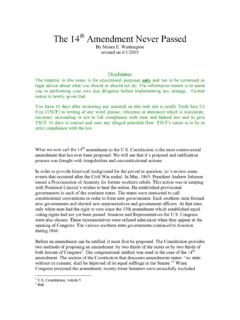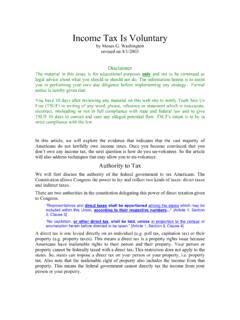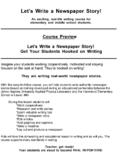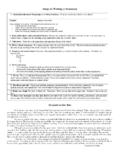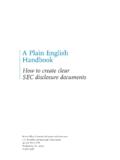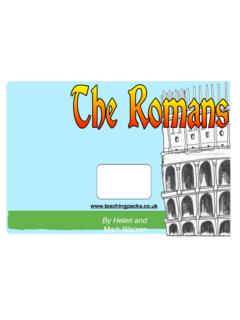Transcription of Using Your Exemption - Truth Sets Us Free home page
1 Using your Exemption by Moses G. Washington Disclaimer The material in this essay is for educational purposes only and not to be construed as legal advice about what you should or should not do. The information herein is to assist you in performing your own due diligence before implementing any strategy. Formal notice is hereby given that: You have 10 days after reviewing any material on this web site to notify Truth Sets Us Free (TSUF) in writing of any word, phrase, reference or statement which is inaccurate, incorrect, misleading or not in full compliance with state and federal law and to give TSUF 30 days to correct and cure any alleged potential flaw. TSUF's intent is to be in strict compliance with the law. Introduction The Exemption essay discussed the concept of having an Exemption from having to pay for anything because there is no money of substance with which to pay.
2 The Exemption can also be thought of as an accounting of what they government owes us for everything they have taken from our parents and us without giving valuable consideration in return. That essay did not, however, discuss how to use or access the Exemption . This essay will discuss how one might be able to use the Exemption to discharge debt. The implications of discovering how to use the Exemption would be staggering. It would mean the ability to get out from under the debt that is crushing so many people. You could say that the current economic system has been set up for our benefit, to repay us as the beneficiaries of the trust (The Exemption essay introduced the concept of the trust). Our goal is to determine how to effectively use this system without destroying it. There have been many kinds of instruments ( , checks on closed bank accounts, banker s acceptance and sight drafts) that people have tried to use to access the Exemption .
3 Many of these have not been successful, and some have even gone to jail because of their use. That s not to say that the instruments are morally wrong. It is quite possible that the people who went to jail just didn t know what they were doing. I suspect that the reason these instruments got people in trouble is because they attempted to use some aspect of the private Federal Reserve system, such as bank routing numbers or account numbers. Those kinds instruments will not be discussed further here since so many negative stories has been heard about them. We will focus our discussion on two kinds of instruments: bills of exchange (BOEs) and bonds. When referring to these as a group, they will be called instruments . There Is No Money Before we get into the main topic, I want to say a bit about money. I take the position that there is no money or at least no money of substance in our current economic system. You may disagree with this position and there is certainly room for debate.
4 But, for the sake of clarity, I will elaborate why I feel my position is has some merit. One definition of money is a medium of exchange . If you want to use this definition, then I would have to say that there is money in our economic system. We certainly do exchange money or Federal Reserve Notes (FRNs) to get the goods and services that we need. But this definition begins to reveal the problem with what we call money . The word exchange means a situation in which equal value is given between two parties. If there is money of substance, then an exchange can take place. By money of substance , I mean something that has intrinsic value of its own, such as gold and silver. Let me illustrate this concept of an exchange. Let s say it is 1900 and you own a clothing store. You are selling men s suits for $20. If someone were to give you a $20 gold piece for a suit, an exchange would have taken place.
5 Both the suit and gold have intrinsic value so both parties received equal value. Now, let s update the story to modern times. You have a clothing store and are selling a suit for $300. Someone comes in and give you $300 in FRNs. A FRN is a note. But w hat is a note? Note. An instrument containing an express and absolute promise of signer ( maker) to pay to a specified person or order, or bearer, a definite sum of money at a specified [Black s Law Dictionary 5th Edition] So, a note is a promise to pay at some future date. It is a debt instrument. An FRN is a pledge on the part of the government to pay a debt. This means that every FRN in circulation is actually a liability of the federal government. It might appear to be an asset to the one holding it, but it just means the government will pay off the debt some day when there is substance. FRNs are backed by the full faith and credit of the UNITED STATES.
6 But where is the government going to get assets to pay off all these liabilities? The government is an artificial entity that has no source of wealth on it its own. The only source the government has is We the People . The natural resources of the earth are the source all wealth. But, without people, natural resources have no value. Gold, silver, oil, coal, platinum, diamonds, timber, livestock, and crops are all products of the earth. None of these have any value until people put their ideas and labor into converting the raw materials into something of greater value. So, in one sense, FRNs are only as good as the willingness of the businesses and people to accept them. Now back to the clothing store illustration. Did the storeowner get anything of intrinsic value when he received the $300 in FRNs? No! The FRN is just paper with no intrusive value. The owner got a promise for payment at some point in the future by the government.
7 No one can determine when the promise of payment might be fulfilled. Since the FRN is a debt instrument, the debt for the purchase of the suit was not paid. You can t pay a debt with a debt; can you? I don t think so. All you can do with an FRN is discharge a debt. While we are talking about money, we also need to discuss the concept of credit. Credit is the ability of a person to borrow money or obtain goods on time based upon the perception that the debt will be repaid in the future. All people posses the potential of virtually unlimited credit because all people have the potential to pay back a virtually unlimited amount of debt. A man, through his own labor, might be able to make a sizable fortune by panning for or mining gold or any other business venture. In the same way, an inventive man s ideas might create a vast fortune. Rather than laboring for gold, a man might invent machines and processes that could mine vast quantities of gold form the earth.
8 If the labor or ideas of people can create a vast amount of wealth, then it could reasonably be said that people have unlimited amount of credit. This unlimited credit does not apply to just special people. It applies to everyone. No one can predict who might be the next person to come up with a idea, invention, song, book, theory or whatever that might make a huge fortune. This concept of unlimited credit does not hold true for artificial entities, like corporations and governments. Artificial entities are not alive and cannot produce one product or idea except through the efforts of people. If a banker is willing to give a corporation a large amount of credit, it is only because the banker is convinced that the corporation has organized their people is such a way that they can create the amount of wealth necessary to repay the debt. In fact, one could say that artificial entities can only create debt.
9 It takes no creative power to create debt. It does, however, take creative power to repay debt. When a company issues a person credit, is the company really risking any of its own resources to give the credit? Research has lead me to the conclusion that the answer is no! A careful study of Modern Money Mechanics, a publication of the Federal Reserve Bank of Chicago, makes it clear that banks don t have any money of their own to lend and are forbidden from lending their depositors money when they issue you credit. What they do is exchange (an even swap of value) your promise to pay for credit in an account, FRNs, that you can use to buy goods and services. Since there was an even exchange, you don t owe them anything. They got the note, ( your promise to pay) as an asset and you got FRNs in an account that you could spend. Since they didn t loan you anything in the first place, the idea of calling them a creditor seems misleading.
10 So when we use the term creditor in this essay, we will put it in quotes to remind you that they didn t loan you anything other than your own credit. We, the living souls, are the real ultimate creditors because it is only through our labor and ideas that any wealth is created. What we have always called creditors in the past are really just fictional organizations ( persons created by the government) to whom we issue some of our own credit. So, to summarize the points that have been made here, the only kind of money in our economic system is credit or promises to pay. When you use a credit card, you are Using credit which is a promise to pay. When you write a check, you are promising that your bank will honor it and transfer credits from your account to the account of the party to whom you wrote the check. When you give FRNs for goods and services, you are giving a promise to pay made by the federal government.

